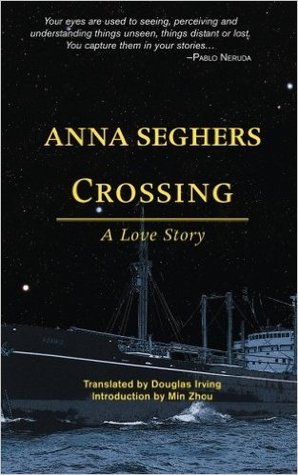“There’s nothing like departure. No arrival, no reunion. You leave a part of the earth behind you for good. And whatever joy and pain you encountered there, once the gangway is raised, ahead of you lie three clear weeks at sea.”
Back in 2013, I read Anna Seghers’s novel, Transit, the story of young German man, a concentration camp escapee, stuck in Marseille, mired down in bureaucracy, trying desperately, to get passage on a ship to safety. Transit made my best-of-year list, and now, three years later, I still think about the story.
One of the things that struck me when I read Transit is how the refugees fleeing Europe were so desperate to escape, passage on a departing ship became the end goal. The refugees didn’t stop to think that a new host of problems would present themselves when they landed on another, distant continent, and that brings me to my first selection for German Literature Month: Crossing: A Love Story in its very first English translation. In many ways Crossing can be considered a companion novel to Transit, for the former follows the fragmented lives of German refugees as they settle and then move on from temporary homes.
 The story takes place post WWII on an ocean crossing from Brazil and is narrated by engineer, Franz Hammer. While cargo is still being loaded, Hammer notes, amongst the throng of passengers, an “odd” young man, a doctor named Ernest Triebel. Gradually over the course of the long sea voyage, Triebel tells his story to Hammer. It’s a wonderfully structured story of exile, identity, displacement, and of course, love. …
The story takes place post WWII on an ocean crossing from Brazil and is narrated by engineer, Franz Hammer. While cargo is still being loaded, Hammer notes, amongst the throng of passengers, an “odd” young man, a doctor named Ernest Triebel. Gradually over the course of the long sea voyage, Triebel tells his story to Hammer. It’s a wonderfully structured story of exile, identity, displacement, and of course, love. …

Ernest Triebel fled Germany as a young boy with his parents shortly before Kristallnacht, and the family arrived safely in Brazil only to face numerous problems, in spite of the fact that they have relatives there to help. Ernest is separated from his parents, and shortly after arriving his mother dies of Typhoid. We get a glimpse of the difficulties these exiles had:
The head of a new practice told my father he would be glad of a fine German doctor–although in actual fact he couldn’t legally employ him. therefore he would register him as one of the nursing staff. He admitted that he couldn’t immediately pay my father a registered doctor’s salary.
So little Ernest Triebel grows up in Brazil, and one of his childhood companions is Maria Luisa Weigand, another German refugee who teaches Ernest Portuguese. Of course, it’s easy to see that there’s going to be a romance between Ernest and Maria, but that’s all that’s predictable here. Any more information would spoil the story, but I will add that while Maria is fully integrated into Brazilian society, Ernest is not, and so the time comes when a decision about returning to Germany raises its head. There’s a central mystery here that takes place, and Maria’s behaviour is open to interpretation.
While the war may be distant for the refugees, ripples of the chaos seep through to Brazil:
The war was far away. Its destructive fire was far away. Only now and then did we breathe the smoke.
For the smoke, it reached us. We saw harrowing things in the newspapers and the cinemas. We couldn’t believe that our gentle and quiet native land should suddenly have pierced the world like a thorn.
But the ripples continue even into the long sea voyage which takes place many years after the war has ended. Hammer, for example, must share a cabin with a hostile Polish man. Hammer thinks the Polish man hates him because he’s German and Hammer mentions that his own father was killed in a concentration camp. The Polish man, however, has simply gone Tropo.
The story is peppered with references to the GDR, and it’s important to remember that Seghers lived there and was subject to censorship and political demands. One character defects, other characters integrate into the new GDR. At one point, there’s a conversation that includes Joseph Conrad, and Hammer notes that he’ll have to find a Conrad novel when he returns home, “if we actually printed him.” While the reference to Conrad includes a hint of censorship and banned materials, it also refers to Conrad for a reason as Crossing is very Conradian in its wonderful structure. And that brings me to the marvellous descriptions of the ocean:
Twilight flooded the sea. Two currents mingled, one already inky blue from the stars’ reflection, the other luminous and restless, perhaps still awash with island foam.
When Communist Anna Seghers and her family fled the Nazis, they’d hoped to make a new life in America, and as the introduction from Min Zhou explains, they landed in Ellis Island in 1941 but were not granted “even a temporary entry.” After the war, Seghers moved from Mexico to West Germany, but in 1950 she became a citizen of East Germany. The invaluable introduction explains how any examination of the work of Anna Seghers is fraught with political implications.
If anyone decides to read this novel, I’d love to have a spoiler discussion about Maria.
Review copy
166 pages
First English Translation: Douglas Irving (with biographical note and an excerpt from The Visit)

Sounds wonderful, and I definitely want to read it – the only question is when. I wasn’t even aware that this had been translated so thanks for the heads up. The link to Transit makes it a must-read for me.
The book was released here in America last month, but I saved it for GLM as it seemed appropriate. It’s wonderful to see this translated. After reading Transit I went looking for more Seghers and was disappointed to see so little in translation.
It would seem that the stories of refugees might be one of the oldest genres. Maybe the Existentialist novel about the stranger looking for home goes back a long way? And obviously still relevant today with Mediterranean crossings. I quite like Sebald, and I notice from the Polish exchange that Crossing looks at who does the telling and listening.
I really liked this book a lot. I liked its structure and the central mystery (which I am still chewing over).
Hi Guy, I’m not surpised with the difficulty to find a crossing that the refugees didn’t think further, what good would it have done them? Last year I read Landgericht to see some of the problems these refugees put themselves in, the novel in Cuba but the reality in Shanghai, the exiles could only cross if they could pay and were then seriously fleeced in the camps on arrival. I’ll look up Seghers when I can
Pat
I wasn’t surprised as much as struck by it especially I think because I’d recently been reading about Zweig and his wanderings. It makes sense that when your life is in danger, all you think about is surviving. It’s only later that other issues emerge.
interested in the Conrad reference because as soon as I read ‘ocean crossing’ and ‘narrated by an engineer’ I thought of Conrad.
Yes Seghers knew what she was doing.
I haven’t read this. Nor Transit. I’ve read others of her novels and stories. They are all so good. This certainly sounds great too. I don’t think I have it here but I’ll have to look.
You would appreciate this one, I think, Caroline.
I’m in the middle of Segher’s The Seventh Cross, and while it had a slow start, I am now totally enthralled. She has a way to tie in the smallest, but most important, observations about people that I find genius. I already own Transit, but I will certainly look for this book as well.
Thanks I’m thinking about getting a copy of it.
I haven’t read Transit yet, though I do plan to (at some point…). Assuming I take to that, and I absolutely expect I shall, this does sound a great companion piece.
Yes I would say read Transit first. Crossing isn’t as fine a novel, but I still loved it.
Whenever I think of the enormity of becoming a refugee I always wonder how you make such an enormous decision let alone make plans for a life that is unknown. This one definitely sounds like a book I’d enjoy especially as the romance is the only predictable part of the plot.
Pingback: German Literature Month VI: (Belated) Author Index | Lizzy's Literary Life